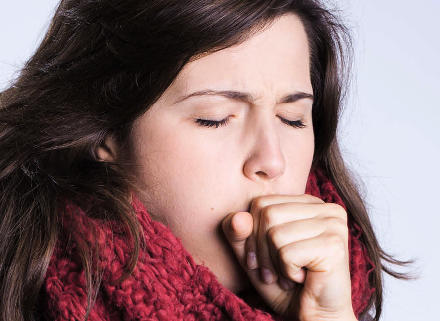Coughing is an involuntary reflex that our body sets in motion to get rid of substances, dust, bacteria and artifacts that enter the respiratory tract through the mouth and can harm health if they come into contact with the lungs.

One of the symptoms in many diseases is a chronic cough, but in other cases it is nothing more than an annoying event and not a sign of danger to health. In this case, it is not necessary to buy syrups at the pharmacy, something that many people do and, although effective, they are usually quite expensive. A possibly more viable option is home cough remedies. Many scientific researchers claim that natural remedies are just as effective or even better than traditional over-the-counter medicine.
lemon syrup with honey
If you have never tried it, you were already late! Homemade syrup made from lemon juice with honey is proven to work to treat coughs in children, babies and adults, as well as sore throats. To make it, put a splash of honey in a saucepan, heat it until it becomes liquid, add the lemon, turn off the heat and stir well. Take half a glass of this concoction.
This treatment is very popular among children because it not only soothes the throat, it is also delicious and children love it.
Infusion with honey and cinnamon
Another homemade trick for wet cough. It is effective because the cinnamon facilitates the expulsion of phlegm and, again, the honey plays a softening role, providing relief to the irritated area. Add two cinnamon sticks to boiling water, then sweeten with honey and if you wish, add a few drops of lemon to the tea. Strain before drinking. The longer you let it steep, the greater its effect, but it shouldn’t get too cold.
take a shower with hot water
You can try this remedy from time to time, since the water vapor is used to remove the cough very quickly. You just need to put the water very hot, get in the shower and wait for the steam to relax the nerves present in the respiratory tract. In addition, it reduces congestion, liquefies mucus and facilitates its exit. The lungs will breathe much better after the bath, and the reflex will have softened.
However, it is a cough remedy that you should not practice frequently, since water at high temperatures is not good for circulation. Not suitable for a baby, very young children or in pregnancy.
Chamomile tea against cough
Chamomile is a natural and effective remedy against all types of coughs, it relaxes the respiratory tract and reduces the symptoms of colds and flu. For the treatment:
- Put water to boil.
- Add the chamomile leaves.
- Turn off the heat after 50 seconds.
- Let the tea steep for 7 minutes.
- Strain the drink.
- Sweeten to taste and drink.
breathe menthol
Menthol and mint clear the passageways and facilitate breathing while decongesting and freeing the throat even from night coughs, controlling reflexes.
drink water frequently
In addition to teas and syrups, it is essential to cleanse the body from the inside by drinking the 2 liters of mineral water recommended by doctors. The persistent dry cough will be diminished as the days go by because the mucosa softens and ensures that the entire respiratory system maintains the moisture of its cells.
lemon with pepper
Pepper is another very effective spice for calming coughs. Cut a lemon in two, put some black pepper on it and suck on it. It will be easier for you if you cut it into slices and absorb its juice.
Another infusion that is used for cough
Apart from the teas that we have suggested, there are many more that work as cough remedies. You can pick the medicinal herbs yourself or buy them from herbalists. In the following articles we show you how to prepare each tea.
- How to make peppermint tea.
- How to make an infusion of lemon verbena or lemon verbena.
- Learn about the benefits and properties of ginger.
Ginger particularly stands out from this list, full of properties for the body. It has a decongestant and toning effect. In addition, the preparation of the tea requires almost no effort:
- Boil water in a saucepan.
- At the boiling point, lower the heat and add the ginger.
- Leave it for a quarter of an hour over low heat.
- As always, strain the mixture before drinking.
- Sweeten with lemon and honey
Finally, another infusion that you can prepare is based on licorice. It has been a fervent enemy against cough for hundreds of years. Also known as licorice, it reduces redness that causes itching and irritation. Pregnant women should consult the contraindications of medicinal plants, just like children.
Pure chocolate for cough?
Yes, dark chocolate is rich in theobromine, a compound that fights dry coughs. The result is much better if you have used another of the previous tricks. Eat a little each day.
Warm milk with…
Guess! What was she going to be with? With honey! Combine honey with hot milk if you like the combination of flavors, it is a good concoction that will reduce persistent cough. Simply add three dessert-size tablespoons of honey to pre-microwaved milk. Don’t overheat because you could further irritate your throat and cause pain instead of relief.
- Onion. The onion recovers the respiratory system by clearing it, although it can be a somewhat unpleasant grandmother’s remedy because it is a food that repeats itself.
What types of dry cough are there?
Before finishing the article, you need to read the following information. Dry cough is not normally accompanied by phlegm. It is also known as irritative cough and does not usually require expectorants. It is the one that occurs in the flu, colds and other viral infections that affect the respiratory system. Additionally, smokers suffer from it, as well as those who suffer from certain allergic reactions. But… what types are there?
- Common dry cough: the one that occurs during a cold, pharyngitis, laryngitis, asthma-like diseases, etc. An irritation is caused in the throat and coughing is done to eliminate viruses and bacteria, thus protecting the integrity of the organism. Apart from home remedies, medications or antibiotics are necessary because it is useless to alleviate the symptom if you do not eliminate the microorganism. If you don’t go to the doctor, your condition will probably worsen over time.
- Acute dry cough. Its duration is around a month at most.
- Chronic cough. Its duration extends beyond four weeks.


